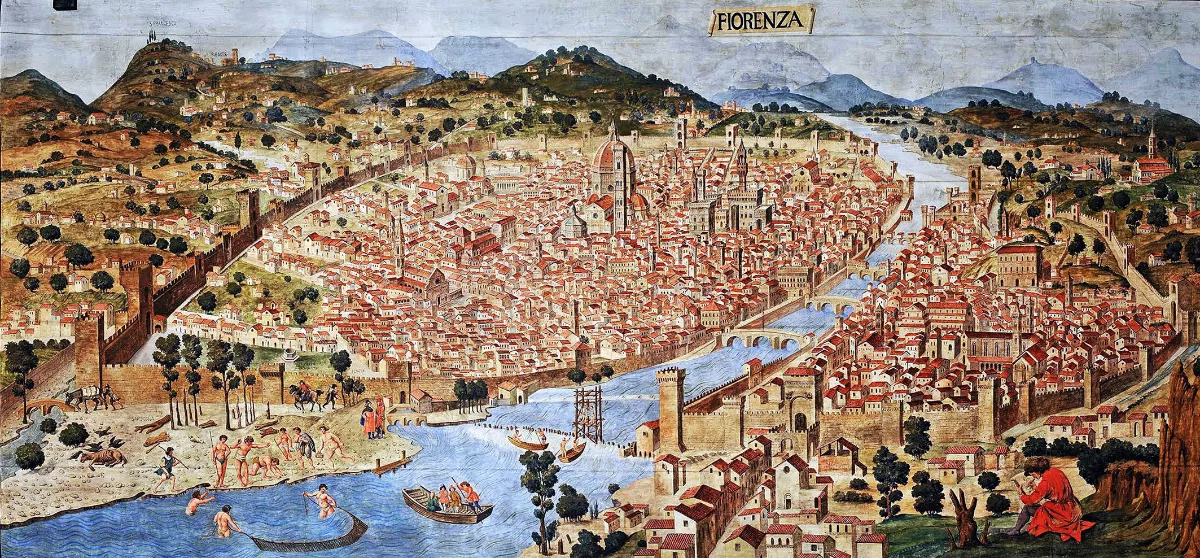This year marks the end of the first five-year cycle of the “Lendület” Medieval Hungarian Economic History Research Group, which has been operating within the Research Centre for the Humanities (BTK) since 2015. Anonymous reviewers, the special committee and the President's Committee for Scientific Evaluation all rated their work as excellent.
Research on medieval economic history has unfortunately been relegated to a bit part since the 1980s, but the establishment of the research group provided an opportunity to bring together previously fragmented and isolated research, thereby multiplying its effectiveness.

Image from the article "A Slave Merchant in the Royal Court of King Louis" with a view of Florence from around 1471. 19th century painting based on a contemporary woodcut by Francesco Rosselli (Palazzo Vecchio)
The primary area worth highlighting in the diverse activities of the research group is a systematic exploration of resources focusing on written and material sources, in which pictorial representations received special attention. As a result, several sources that have not been known and have thus not been utilized so far have been explored, and the collection and analysis of material remains has shed new light on economic history. A wealth of interesting information was found in the sources studied: for example, the tax register for Nógrád county in 1457; a taxation certificate of Körmend city from the 14th century, which helped identify a previously unknown location for collecting this tax; a full-text copy of a 1412 charter believed to have been lost, which provides additional information on the role of the probator in coinage; the original of the Zagreb Fair Regulations; several certificates providing insights into the operation of the Buda depo at the end of the 15th century and the activities of the merchants of Boroszló there; a Gölnici town book created before 1501 within the Thurzó Codex; textile permits; various weights; and new coin types. The sources were supplemented by archaeological excavations.
The explored sources have not only become widely available for research but have also provided an excellent basis for various publications. Each year, the research group submitted a volume of papers with the authors listed as members of the research group as well as researchers from other institutes. This year, an English-language volume was also prepared to make the latest results of the study into economic history available to international researchers. The volumes present the latest research results of the members of the group, such as the 14th century tasks of the master of the treasury, city taxation, the operation of the Körmöc and Bratislava chambers, the copper chamber, the county treasury, military financing, mining districts, Mark (medieval weight) units, as well as the interpretation and origins of certain passages of economic history with respect to the Buda Code Book, the iron and copper trade and various commercial arenas.
The research group organized several conferences and workshops to discuss more focused topics with an emphasis on their interdisciplinary nature. In 2019, a two-day international conference on the Economic Functions of Urban Spaces from the Middle Ages to the Present was organized with the participation of around 70 foreign researchers.
The research group is also extremely active in the field of promoting science. In addition to organizing various exhibitions, the group has been publishing a 'magazine' entitled Monthly Features on the website of the Institute of History of BTK since 2015, which publishes short, scholarly, yet easy-to-understand articles to provide an insight into the diverse world of medieval economic history, bringing the past closer to the people of today.
The research team has also done much to promote the training of the next generation of researchers. One of the important goals in setting up the research group was to encourage the participation of PhD students, in addition to experienced researchers, in order to ensure an ongoing supply of young scholars. The group's program and achievements so far have also been presented at several universities and conferences, thus drawing the audience's attention to the versatility and importance of research on economic history.